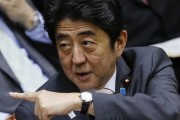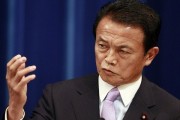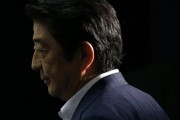
The Tokyo Headquarters of the Bank of Japan.
Given Japan’s long recession, one of the central tasks of the new Abe administration is economic reform, specifically to reverse deflation through monetary easing [or quantitative easing, though this expression is not used] and inflation targeting.
This article discusses these new policies, which have been dubbed as ‘Abenomics’, and also a ‘secret strategy’ between the government and the Bank of Japan: the introduction of a 50,000 yen note.
Needless to say, it is the idea of a 50,000 yen note that has captured the attention of Japanese netizens, although many seem to think that the policy is either irrelevant or unnecessary as a stimulus to economic growth.
From Zakzak.co.jp:
Issuing the 50,000 Yen Note: A Secret Strategy To Stimulate Consumers
At a monetary policy meeting on January 22 the Bank of Japan decided to implement a target inflation rate of 2%, with the intention of putting this into action soon, as well as to go ahead with monetary easing from 2014 for an undefined period of time.
On the afternoon of the same day, after having received a joint report from the government and the Bank of Japan, Prime Minister Abe Shinzo stated to journalists in his official residence that, ‘This is an epoch-making document in Japanese monetary policy. You could also call it a regime change,’ and effectively gave a victory speech.

Shirakawa Masaki, Governor of the Bank of Japan.
Since winning the leadership election for the Liberal Democratic Party in September 2012, Abe’s frequent remarks over monetary easing have brought high stock prices and a devalued yen, and stock traders are hopeful for what is being termed ‘Abenomics’.
The market is severe. Executives from foreign investment banks told me, ‘(This recent strengthening of co-operation by the government and the Bank of Japan) as a plan is as we expected, but the contents of the plan are shabby.’
Still, this kind of reaction has already been taken into consideration, and as substantial monetary easing progresses, whispers at the Ministry of Finance (Manago Yasushi, Vice Minister of Finance, who joined the ministry in 1978) suggest that there is a secret strategy intended to stimulate consumers’ sentiments.
And what could that secret strategy be? The issuing of the ‘50,000 yen note’.

What the new 50,000 yen note might look like.
There is also the suggestion (from the Asahi Shimbun) that ‘If we continue lax fiscal administration without the economy having recovered, then the Bank of Japan will simply end up as a ‘printing machine’ that prints notes as the government says and merely buys the national debt’, but the limits on note issuance lie with the Ministry of Finance.
Article 47 of the Bank of Japan Law states that the type of banknotes issued is subject to government ordinance. That is to say, that the jurisdiction of the Ministry of Finance Financial Bureau’s Treasury Division to issue notes is ultimately decided by the Minister of Finance, and if the agreement of the cabinet is obtained, then it is always possible.
The point is, that this is all at the discretion of Finance Minister Aso Taro, who is also the Deputy Prime Minister.
Continuing with what we were saying earlier about the Ministry of Finance, it can be explained like this: ‘We are well aware that there are differing opinions in economics. But given that economists from the reflation faction, who aim to move from deflation through monetary easing, have given suggestions to both Abe and Aso, there is a good possibility that this will work.’

The Yale Economist Professor Emeritus Hamada Kouichi, who agrees that inflation is a necessary move.
The Yale economist Professor Emeritus Hamada Kouichi, who Prime Minister Abe named as the brains behind the policy of monetary easing, and Nakahara Nobuyuki, a former member of the Bank of Japan Policy Board, in whom Abe quietly places his trust, have both emphasised the importance of target inflation and that ‘we must do whatever we can’ to stimulate the economy (Segawa Takao).
Comments from 2ch.net:
名刺は切らしておりまして:
Well, it would be good if this doesn’t turn out like the 2,000 yen note…
名刺は切らしておりまして:
There’s no way to say this other than its a completely stupid idea.
名刺は切らしておりまして:
Might be a good thing if we had a 100,000 yen note and a 50,000 yen note.
名刺は切らしておりまして:
Could it be that even in the printing press where they print the notes there’s no work and they have too many people?
名刺は切らしておりまして:
It’s going to be really irritating to get that kind of change. I don’t want all those notes. There’s enough change when you use a 10,000 yen note.
名刺は切らしておりまして:
If they make a 50,000 yen note then retailers are going to have a difficult time of it…because they’re going to have to give you loads of 10,000 notes as change. Robberies will probably also increase, too.
名刺は切らしておりまして:
Preparing for hyper-inflation, are we?
名刺は切らしておりまして:
So instead of using a card when you buy something expensive, you use a high-denomination note? Fucking stupid idea.
名刺は切らしておりまして:
I’d be frightened to have a wallet with 50,000 yen notes in, so I wouldn’t use it w It’s inconvenient, so it looks like they’d do away with them before they even got into circulation.
名刺は切らしておりまして:
I mean, we don’t even need the 10,00 yen note. I always wonder whether people who pay at the till with 10,000 yen notes are idiots. Why the hell are these bastards walking around with 10,000 yen notes? It’s just irritating, and they take more time with the bill because of it.
名刺は切らしておりまして:
If you’re buying something where you’d use a 50,000 or even a 10,000 yen note, then you’d just use your card. If it’s small change, like you’d use at a convenience store or bookstore, then use e-money. I only ever have ten 1,000 yen notes in my wallet.
名刺は切らしておりまして:
I thought they had put the 2,000 yen note into circulation because of inflation [it was actually to commemorate the 26th G8 summit]. I guess that the 50,000 yen note might also go into circulation if it’s to increase inflation.
名刺は切らしておりまして:
Well, convenience is convenience, but how are these notes it relevant to the economy?
名刺は切らしておりまして:
It’s the 2,000 yen note all over again.
名刺は切らしておりまして:
It would mean that shops would need at the very least 40,000 yen in change in their registers, so the amount of actual money flowing in the market would conversely be reduced, wouldn’t it?
名刺は切らしておりまして:
Wouldn’t it be more effective if they abolished the one yen coin?







